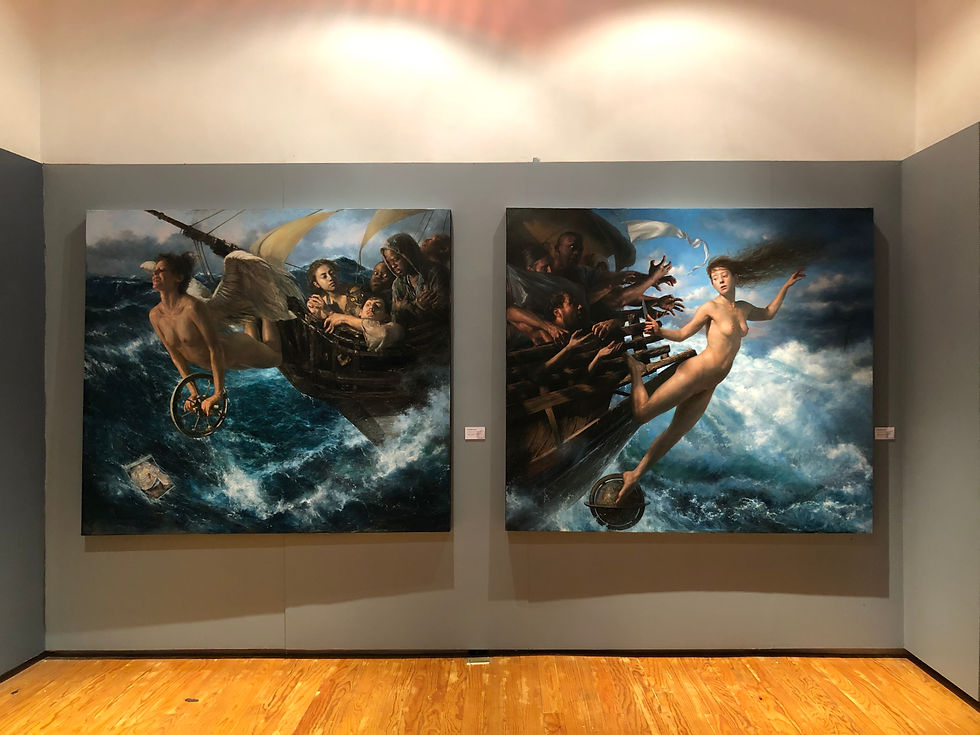Segmento I,II,III,IV,V. Oil on canvas. 200 x 70 cm. (c/u)
Oscar Villalón
“The phenomenon of migration has accompanied us since the dawn of our civilization and is also a characteristic in other species where the common factor is to find better living conditions.
When in 1989 we lived the fall of the Berlin wall really felt like a hopeful symbol, the cold war ended and we naively believed that it would be an advance in the development of our species in the plane of coexistence, ... but we were wrong.Faced with the current world scene where the value of life fades, with periodic genocides, refugees fleeing misery where the word brotherhood appears empty of meaning, and as a paradox, today there are more walls under construction in the world than in 1989, more and more naturalized in our lives that indifferent or accomplices observe how the other, the different, is left out.
This work challenges us as people, it calls us to ask about our own walls.
That is why art, fundamental in all its manifestations, strongly expresses the destruction of the walls, those of yesterday, those of today, those of always converted into a hope ”.

Alejandro DeCinti
MIGRATIONS, originates from the cycle of paintings "Ship of fools" that began to develop five years ago addressing the concept of "navigation as the happy trip or shipwreck" a metaphor for personal, historical and spiritual human life. Life similar to a sea with a vast horizon, beautiful and abysmal, wonderful, deadly, of quiet or impossible travels with uncertain destinations. When Sebastián Brandt published his Renaissance moral satire "The Ship of Fools" (1494), which in turn would inspire Erasmus's "In Praise of Madness" (1511), he made a sharp critique of the human condition using the powerful metaphorical image navigation that, by then, would discover for the first time the complete shape of the world.
Thrown into existence, each human being makes his personal and collective journey in search of the satisfaction of his needs, among which aspects as diverse as subsistence, security, fame, profit, knowledge or spirituality can be found.
From a reflective view of the individual being and in the light of great philosophical or religious systems, human vicissitudes as a whole appear clothed in a tragic fundamental contradiction transcript of the deeply human condition.

Heder contreras
The Universal Declaration of Human Rights establishes that "all human beings are born free and equal in dignity and rights and, endowed as they are with reason and conscience, must behave fraternally with one another"; and that: “1. Everyone has the right to move freely and to choose his residence in the territory of a State. 2. Everyone has the right to leave any country, including their own, and to return to their country ”.
Migration as a human right many times violated by countries, institutions and even by people, contains a series of vicissitudes that the migrant suffers for better or for worse, in my case I want to refer to migration from the point of view of those who remain. Entire families during the course of history have been affected by migration, either by going in search of a better life ... Many others by exile or the lack of opportunities in their native country, leaving behind a wife, children, parents and friends. many times without return. Leaving those who remain in a state of vulnerability, in this series of works I try to represent the dispossession, sadness and loneliness of these people, giving special importance to the role of women, who are often the ones who stay in charge of their lives. the family.

Emmanuel Sierra
Traveling through the world, through places and landscapes, is part of the spatial dimension of the physical act of migrating. Psychologically, the migrant faces a process of shock, where reality is confronted with his inner emotional space that refers to a home of limited dimensions, on a human scale. The homeland, places of the missed past that flows from the infinite and blurred birth, the infinite completeness of love, spaces full of personal meanings, the insignificance of man's physical being is confronted with the immeasurable dimensions of the world. The landscape and its precarious way of being in it becomes a fundamental framework of this human drama.
This series focuses on the various natural contexts where dimensions and natural forces dominate, placing the being in its place, allowing the viewer to position himself and re-dimension the drama. Many times the scene can be tragic but there are undoubtedly subtle and sublime moments where amazement and wonder enter at the enigma of the meaning of the world and its formidable beauty.
Exhibition "Migrations". Don Quixote Iconographic Museum. Guanajuato, Mexico.
October / January 2020




























